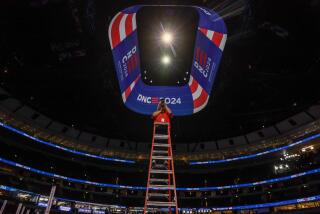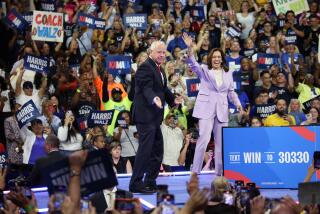N.Y. Pledges to GOP Convention Hit $60 Million
- Share via
NEW YORK — Fully a year before the first Republican presidential convention in New York City’s history, prominent local donors already have pledged about $60 million for the event, and plans are underway that even include building a bridge over a busy Manhattan street.
Hotel rooms and places where delegations will hold receptions are being being lined up, and the prospect of almost 50,000 visitors attending a gathering that could pump as much as $150 million into an economy still recovering from the Sept. 11 attacks is highly alluring both to the tourist industry and to city officials struggling to close budget gaps.
“This is a tremendous vote of confidence in the long-term prospects of New York City,” proclaimed Mayor Michael R. Bloomberg when the Republican National Committee announced its choice. “You have my word this convention will go down as one of the most successful in our nation’s history.”
Putting his personal money behind his words, Bloomberg has pledged $5 million to the host committee, which is within easy reach of its fund-raising goal of $64 million.
Bringing the nominating convention to the city that suffered the nation’s worst terrorist attack offers President Bush’s reelection campaign clear political opportunities as it seeks a springboard for the fall election.
“Coming to New York makes a lot of sense for the Republicans,” said Lee M. Miringoff, director of the Marist Institute of Public Opinion, who noted that the World Trade Center site offers a highly symbolic setting for Bush to provide continuity between the terrorist attack, the administration’s response and what would lie ahead during a second term.
“There will be some big symbolic thing at the trade center site,” Miringoff predicted. “That makes all the sense in the world for them.”
The Republican convention, like the the Democratic Party’s counterpart in Boston, has been declared a national special security event.
The designation places the Secret Service in charge of coordination and planning. Meetings are ongoing with city, state and federal agencies about the security challenge, which has increased dramatically since Bill Clinton was nominated at the Democratic Convention in New York in 1992.
“World events have changed and things are much more complicated since 1992,” said Jean Mitchell, a Secret Service spokeswoman. “We are considering all alternatives to make it a secure environment.”
The special status, which has been applied to such high-profile events as last year’s Salt Lake City Winter Olympics and football’s Super Bowl, clears the way for additional federal assistance, including personnel and radiation, biological and chemical detection equipment.
The designation also allows Congress to allocate funds to repay the city for the $22 million the Bloomberg administration plans to spend to keep the convention secure.
One advantage in this area is the size and experience of the Police Department, which has played a prominent role in protecting five Democratic conventions in New York.
Tom Ridge, the secretary of Homeland Security, acknowledged this at a City Hall news conference last month with Bloomberg and New York Police Commissioner Ray Kelly when the special designation was announced.
“As good as the Secret Service is, nobody knows the city better than the commissioner and his police force,” Ridge said. “We defer to them.”
A principal task for security agencies will be to protect Madison Square Garden, where the convention will take place from Aug. 30 to Sept. 2. As in 1992, police are expected to take the lead role in guarding surrounding streets and maintaining order during demonstrations.
Plans for reconfiguring the sports arena and the nearby James A. Farley Post Office Building are in the “very early stages,” said Rori Patrise Smith, a GOP convention spokeswoman.
Among other expenses, the host committee will pay for renting Madison Square Garden and the cost of constructing a bridge across Eighth Avenue, linking the Garden with the post office.
New York’s bid topped efforts from Tampa/St. Petersburg, Fla., and New Orleans to host the convention.
More to Read
Sign up for Essential California
The most important California stories and recommendations in your inbox every morning.
You may occasionally receive promotional content from the Los Angeles Times.












